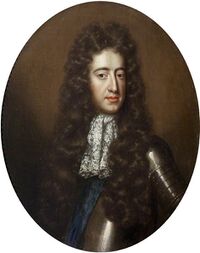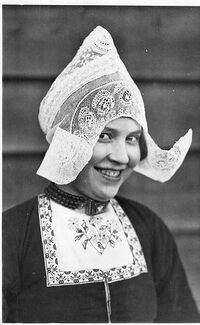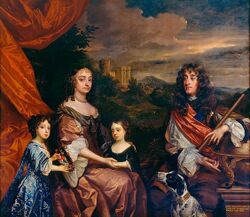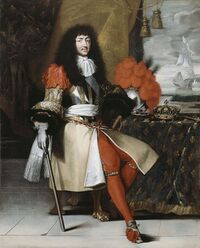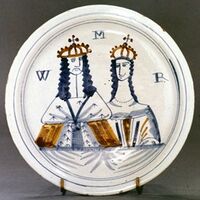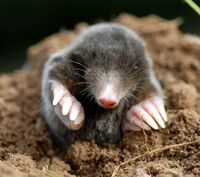William of Orange
“I just had my hair done today”
William of Orange (4 November 1650 – 8 March 1702) was the Anglo-Dutch ruler who gave the 'pip' to the Catholics when he overthrew King James II in 1688 and made King Louis XIV of France choke in his brandy with his orange-hued success. Billy was also a spindly, stick thin ruler with a permanent cough and wore a wig that was twice his body weight. In Protestant Ireland he is still regarded as a hero, and appears on murals riding over a prone Pope to represent the defeated Papists.
Orange Blossom years[edit]
William was born to a Dutch father, William of Orange and an English mother, Mary of Pear (also Princess Mary of England). William's great grandfather had been William the Silent, a hero of the Dutch resistance to Spain at the end of the 16th century. Since their defeat of Spain, the House of Orange had acted as de facto rulers of what was called the 'United Provinces', a somewhat misleading name as the rebellious Dutch were anything but united. However the Oranges were not kings but held the office of 'Stadtholder' or 'Streetwalker' as it is translated into English. William's family usually held a few of these offices and for that, received the best seats in meetings and musical festivals.
The young 'Orange' should have got these offices but following the death of his father (he died before being bothered to greet the young Billy into the world), the Dutch chose to reject their quasi-royal family and go for a full-on Republic. In this they were encouraged by the new Republican government in England headed by Oliver Cromwell. The young Prince William was excluded from power and told to go to his room for the next 20 years.
English lemons[edit]
Despite the similar forms of government, the English and the Dutch fell out of trade. Basically, the Dutch had it and the English wanted it. In addition, the English also wanted the self-declared King Charles II re-exported from his place of exile in Holland — dead or alive (and to be dead pretty soon after). Young Billy wasn't involved in any of this and remained an outsider.
During this period the English and the Dutch fought a succession of naval wars in the English Channel and North Sea. This lead to a lot of bad feelings and choice jokes about each other. The English were convinced the Hollanders only fought when drunk (Dutch Courage), didn't understand how the Antiques Roadshow worked (a Dutch auction) and would lose their hats in bed and find them in strange places (Dutch caps). This explains why later William of Orange was viewed with mix feelings later on by the English. They were thankful he arrived to oust King James but, dammit, Billy was an Edam of cheese crunching bore.
Vitamin C[edit]
William bided his time, hoping for a national recall. None came and he grew up, William got uglier and uglier. So his wigs got bigger and bigger until only his eyes would peep out. Eventually the Dutch rejected their government for ballsing up the defence of the state against the French and literally tore their leaders into tiny fragments. William was brought down stairs and became the First Stakeholder of Holland.
The Orange ruler was getting interested in women for dynastic reasons and thought about marrying his cousins in England, the sisters Mary and Anne. King Charles II hoped for better matches for his nieces than the thin Dutch urchin with the long nose. Their father James, Duke of York wasn't consulted as he had come out as a closet Catholic and therefore debarred from having an opinion.
The Prince visited London to seal the deal with Charles. The sisters hid behind curtains with just their bare toes and legs visible. After a few hours of pondering (William was a slow thinker) and the use of the infamous Dutch Tickler, William chose the feet with the fewer bunions and warts..these turned out to be Mary's tootsies. Anne wasn't left on the shelf for long as Charles traded her in with a Danish prince for a crate of beer and a box of wooden bricks. "Dutch or Danish," said Charles, who cares which?
William brought back his bride to Amsterdam. The Dutch were surprised to see yet another English bride for their Dutch boss but then got on with life as before.
King Louis Takes the Pip[edit]
King Louis of France actively disliked this new marital alliance between the British and the Dutch. He wanted to squeeze William dry for preventing him annexing Belgium from the Spanish. Since William's ancestral home lay within France proper, Louis broke down the doors that led into the Principality of Orange and annexed it. A pile of orange peel sent to Amsterdam was sent as an extra insult.
The French armies quickly overran the Low Countries until they reached the Dutch dykes. William stood with his companions on a banked wall and as he saw the French army swarm towards him, he unplugged the dykes and drowned the lot of them. This meant the Dutch lost their land but could live on fish if need be. The French just drowned where they stood.
With the deepest reluctance, King Louis called the war off against the Dutch and instead picked on the Spanish who made easier pickings. End result was a draw which couldn't be decided on penalties.
An Invitation[edit]
In 1688, the English asked if they could replace one head of state with a bad wig (James II) with another head of state with an even worse one. But James was Catholic and his wife had just given birth to a son called James the Old Jacobite. This suggested that the Pope would be coming over for the christening to the English bigger wigs (and Whigs) took a vote and selected William as king. As long as he brought over his wife Mary for extra pudding and custard.
The Dutchman flew across the channel and within short order, King James had left London with his wife and son and applied for asylum in France. This wasn't the end of James as he came back via the back door but lost the Battle of Boing-Boing in Ireland and that left his hopes for a restoration well and truly stuffed.
King William and Queen Mary: A Pair of Clockwork Oranges[edit]
Dutch Billy and Queen Silly (as William and Mary were called) agreed their new employment terms from the English. This established politicians as the real rulers of the country and left the monarchs to open factories and attend garden parties. William had more power in Holland than he had in England but was at least able to tap into the English piggy bank to collect more money. This became such a regular event that the English created the Bank of England so that they could bounce William's cheques.
Somewhat rarely for a monarch, William didn't much care for women or mistresses and seemed happier at playing soldiers. The Dutch usually lost against the French and this would make William chew his wig until it fell apart. Then Mary died when she fell over when trying to pass her monster of a sister Anne in a corridor. As the couple had no heirs, this made Anne next in line to the throne.
Orange squashed[edit]
William's enemies were still active and eventually they hatched a nasty plan. A mole was recruited to undermine the gardens in Kensington Palace and create enough holes for a horse to fall in. By what magic the Jacobites used to recruit a mole for this job remains hidden but it did its work. In 1702 William and his horse tripped on a mole hill. William hit the ground first — followed by his horse on top of him. When the kings servants found them later, William had been squashed flatter than the lands of his native Netherlands. The mole escaped to France.
Legacy[edit]
The English with their usual dislike of foreigners shed no tears for Billy's death. He remained a hero in his homeland and also in Protestant Ulster where wearing orange was a sign you were not a catholic. That tradition still lives on.
